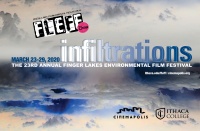 Online exhibition of artist responses to viral infiltrations before Covid-19
Online exhibition of artist responses to viral infiltrations before Covid-19 Online exhibition of artist responses to viral infiltrations before Covid-19
Online exhibition of artist responses to viral infiltrations before Covid-19
As its 23rd annual edition migrates to virtual spaces to respect public health guidelines to contain Covid-19, the Finger Lakes Environmental Film Festival presents “Radical Infiltrations,” an online exhibition of digital media, exploring the power of questioning and even challenging infiltrations, such as the manipulations of profit-driven algorithms and the relentless rhetoric of political polarization.
The exhibition can be accessed on the FLEFF website at www.ithaca.edu/fleff/infiltrationsnewmedia/
“At a moment when no aspect of our daily lives seems safe from the infiltrations of surveillance and monetization, radical infiltrations can challenge inequitable systems. Rather than attacking systems from outside, radical infiltrations attack from within. When we inhabit systems, we can work against their structures of power and claim common spaces,” said New York University Abu Dhabi associate professor Dale Hudson, who curated the exhibition along with Wichita State University assistant professor Claudia Costa Pederson.
Infiltrating physical and virtual environments, projects include performances that involve WiFi or community journalism, short videos, and Instagram feeds.
Featured artists include Roger Beebe, Yoav Lifshitz with Israeli Pirate Party Collective, Amelia Marzec, Vera Sebert, studioThirdWorldCollective, Kailas Sreekumar, and Jodi Zellen with work from Austria, India, Israel, and the United States.
Three projects have been selected for the exhibition’s jury prizes.
Amelia Marzec’s “Weather Center for the Apocalypse” and Yoav Lifshitz’s “Occupy WiFi Project” offer alternative networks for communication that are improvisational and provisional. Unlike the expanding power of transnational corporations like Google, Amazon, and Alphabet, and attendant state control, these new networks hack old and new technologies to communication without the manipulations of profit-driven algorithms and state propaganda.
Roger Beebe’s “Amazonia,” asks us to think about the damage e-commerce does, not only to its workers, but to the environment because of the massive amounts of energy required for server farms.
Launched in 1997 as an outreach project from Cornell University’s Center for the Environment, the Finger Lakes Environmental Film Festival was moved permanently to Ithaca College in 2005. It is housed in the Office of the Provost as a program to link intellectual inquiry and debate to larger global issues.
For more information, contact Dale Hudson, dale.hudson@nyu.edu or Claudia Costa Pederson, ccp9@cornell.edu
FLEFF: A DIFFERENT ENVIRONMENT
https://www.ithaca.edu/intercom/article.php/20200324214351849